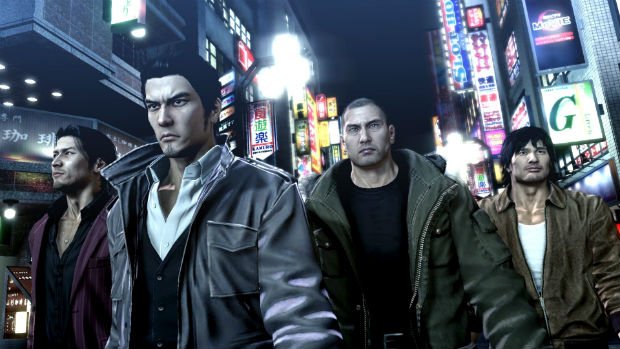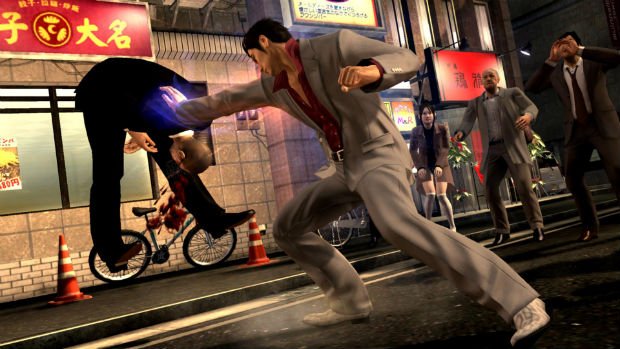Why I Love: Kazuma Kiryu's suit in Yakuza
No one is more badass than Kazuma Kiryu. In Yakuza 5, when he confronts a mob boss while searching for an abducted friend, Kiryu turns down a drink of whisky by punching the bottle. In half. Directly into the offering mobster’s face.
Yet for all of his magnificent stoicism and uprightness, Kiryu still walks around in a gaudy white leisure suit with a silk red shirt underneath. The shirt’s collar is so wide that 1970s David Bowie would likely take one look at it and say, “Damn, man, dial it back.” It’s not like his suit is cool, either. When he puts it on in the first Yakuza, it’s ten years out of fashion. (He’s been wrongly imprisoned for a decade.) It would be like if a hero with a heart of gold walked out into 2015 dressed like one of the silhouettes in a classic iPod commercial. When Kiryu inevitably puts the suit on in each Yakuza game, though, I don’t hide my eyes in sympathetic shame. I stand up and cheer. Because that suit is amazing.

For starters, it’s the physical embodiment of Kiryu’s entire philosophy: just because something’s old fashioned, that doesn’t mean it isn’t worth preserving. He’s the classic cowboy, unafraid of bullies but only willing to use force if it’s the absolute last resort, making honest treatment of others the highest ideal. Kiryu wanders around in every game, hopelessly mystified when people are cruel to each other and totally devoid of irony.
Even when he’s surrounded by yakuza who behave like what you’d expect, career criminals using violence for personal gain, he adheres to a classic ideal of honor and protection that was never the reality of the Japanese mafia. “For me, being yakuza is a way to live,” he says in Yakuza 5, without a shred of self-awareness. The suit and the man wearing it are hopelessly anachronistic, not born out of any real era of fashion but a rose-colored idea of a better past.
The ridiculous wide collar and flash seams aren’t just brilliant for informing character but they make for a reliable visual storytelling beat in the series. When the suit inevitably appears in Yakuza, that’s when you know things are about to get serious, the graphic equivalent of Martin Lawrence pointedly saying, “S*!# just got real.” Like all hero criminals in fiction, Kiryu is in a perpetual state of trying to leave his past behind only to get sucked back into the thorny politics of the Tokyo underworld. In Yakuza 3, he’s off in Osaka running an ocean-side orphanage, a beach dad in a red button down t-shirt suited for nothing but barbecues and ice cream runs. In Yakuza 5, he’s living in Fukuoka trying to make ends meet working as a cab driver. When he’s working, he’s in the drab uniform of a paid driver and when he’s off he walks around in a dull rain coat.

Just when he thinks he’s out, he gets pulled back in. Kazuma Kiryu always spends the first half of his screen time in Yakuza games resisting that pull back into the criminal life. He doesn’t just want to live honorably, but simply. Something or someone always goes too far, though. The kidnapping of an old friend, unsavory characters that threaten his surrogate children; Kiryu’s always pushed past his limit. Does he declare to someone that he’s not going to take it anymore, that something has to be done? Hell, no. The game lets you know Kiryu’s answered the call to action when he busts out the silk and polyester.
Yakuza games are intoxicating because of their deep contradictions. Hilarious and totally serious, utterly cheesy and undeniably cool; every game is a twisting path through a world that feels both authentic and insane. One second, you’ll be watching an ex-con slowly smoking a cigarette while he delivers a soliloquy on lost honor. Then ten minutes later he’ll be beating up a room full of grown men in diapers and helping an Eddie Murphy lookalike take weird cellphone pictures. Kazuma Kiryu and the games he stars in shouldn’t work, but they do. Just like that suit.
Weekly digests, tales from the communities you love, and more



